#but i like when pompey gets weird and this theory makes him weird. so.
Explore tagged Tumblr posts
Text
connected to the daddy issues poll, some weeks ago i got really into finding out who mucia tertia's mother was (because as it turns out wikipedia treats masters of rome as a credible source) and without going into details, what we do know is that she was related to cato's family according to plutarch and that she may have also been the claudii's mother. and like. that theory is difficult to confirm but i'm interested in it because it makes pompey's marriage plans for his son (first with cato's daughter/niece, then with appius claudius's daughter) kind of Weird since pompey jr would already be connected to these people through his mother. it's as if pompey was attempting to recreate the family connections he lost in the divorce while erasing mucia's influence from the picture.
#“some weeks ago” like the bookclub didn't witness me have some kind of crisis about it#spam tag#pompey#gnaeus pompeius jr#anyway it's absolutely not certain and also the main supporter of the 'they're all half-siblings' theory is shackleton bailey#and he takes appian at face value which is a Problem.#but i like when pompey gets weird and this theory makes him weird. so.#ALSO really funny world where cato and the claudii are related i guess?#barber chair#<- genealogy tag. will need to back tag#additional thought is that. idk why scaevola wouldn’t be connected to cato’s fam? but scholars never assume they are so eh
5 notes
·
View notes
Text
A "BRIEF HISTORY" OF THE FALL OF THE ROMAN REPUBLIC: For no particular reason
ONCE UPON A TIME there was a city that wasn't called Rome yet founded by two brothers, Remus and Romulus. Romulus killed his brother and got the town named after him. NEVER AGAIN UPON A TIME, the city had a king everyone hated so much they just all stabbed the crap out of him at once, and made a big public pact that next time there was a king, they would do the same thing. This isn't foreshadowing. LATER they went to war with Carthage, another city in North Africa, and although they technically won that war, the enemy general Hannibal was so cool (he took elephants over the alps into Italy! Terrifying) we remembered him forever and while history remembers the roman generals, we really don't care. UP UNTIL NOW the roman army was entirely 'citizen-soldiers' who were expected to provide their own equipment and who treated the occasional war as a temporary distraction from their normal jobs. This was replaced by full-time soldiers partially for logistical reasons (it's bad when your entire army is like 'Sorry, can't fight in October') but also for economic reasons- the poor could no longer reliably afford swords. As such, it was exclusively the poor who signed up for the army, and they were extremely aware that if the army ever stopped paying them, it was a return to crushing poverty. WHY WERE THE POOR POORER? The rich were richer! For complex legal reasons, but the biggest among them was that the rich had bought all the farmland. There was also special government farmland that in theory was available to poor people on a temporary basis until they could afford to buy their own farms, but the rich tended to acquire that too. DEMOCRACY TO THE RESCUE: A guy named Tiberius Gracchus attempted to enforce an existing law that you could only own so much land. It was on the books but nobody actually was doing it. During his political campaign, a shit ton of senators clubbed him to death with chair legs for threatening their wealth. OKAY ONE MORE TRY: Gaius Gracchus, his little brother, tried to do the exact same thing. He did much better until he tried to extend citizenship, which went over about as well as it does in modern times, and he committed suicide before being torn apart by an angry mob. WHAT IF SOMEONE POWERFUL TRIES IT? Gaius Marius, a famous general, attempts to pass the same basic set of reforms, but is defeated at every turn. He's also a petty bitch, so he tries to steal command of a giant army about to lead a cool war from his arch-rival, Sulla. Sulla responds by killing the messenger and marching on Rome, which Marius attempts to defend by grabbing every gladiator he can find, in the hopes that a ragtag band of badasses might just work. It does not and he escapes. Sulla kills all his friends and allies and anyone who ever talked about how cool reform would be. He makes eye contact with a young Julius Caesar and explicitly says "I'm not going to kill you, but I have a weird vibe you're going to grow up to be just like your uncle Marius." HE GROWS UP TO BE JUST LIKE HIS UNCLE MARIUS: Julius becomes a politican and teams up with a great general named Pompey and a great rich dude named Crassus, on the theory that with his public speaking skills and their resources and connections, they could take over the country. They do! Julius then takes the opportunity to borrow the army for a bit and conquer a huge chunk of Europe just for fun and profit because he's a great general apparently. Crassus gets jealous and tries to conquer syria but dies. CIVIL WAR: Without their mutual ally, Julius and Pompey begin circling each other. Julius is ordered back to Rome to end his military campaign, but he's worried about what happens if he steps down as general. (Similar to today where you can't prosecute the president for crimes APPARENTLY, Julius was immune as long as he was on duty) So he brings his whole army back to Rome and the war begins. Julius wins! IT'S TOO BAD THERE WASN'T A WELL ESTABLISHED PRECEDENT FOR THIS: Julius starts quietly hinting that he should be king by like, organizing astroturf movements and having people graffiti crowns onto statues of him and paying attractive people to stand in bars and crowds and be like "This would be much better if we had a king again!" Inevitably, everyone stabs him at once. SEQUEL: Julius's adopted son, Octavian, is a shutin nerd whose best friend, Agrippa, is a beefcake military powerhouse, but this was still like 30 BC, so nobody wrote slashfic about them. With Julius's death, suddenly there's no one unarguable ruler again, and everyone fights to be the next Julius. Octavian wins. He changes his name to "Augustus" which is roman for "Awesome Guy" and starts calling himself "First Citizen" which is very different from king and is careful never to visibly like, order anyone around so much as just quietly make suggestions through back channels that always happen because everybody knows what's really going on. But the facade works and nobody stabs him to death, possibly because he's better at politics than big J, or possibly after three civil wars in a row everyone was just TIRED. By all accounts, he was a pretty solid governor. EPILOGUE: Tiberius, his successor, would have wild orgies with child slaves and have so many political rivals killed that the bodies dumped into the river sometimes accidentally dammed it and they had to send dudes out with poles. After that came Nero, a guy so messed up you know his name, who was so obsessed with killing christians and jewish people that they wrote a bunch of mean stuff about him using a nickname, 666, and that's where that comes from. It's like, the scrabble score of his name in ancient judiac numerology code.
4 notes
·
View notes
Text
Paganini Horror (1989)
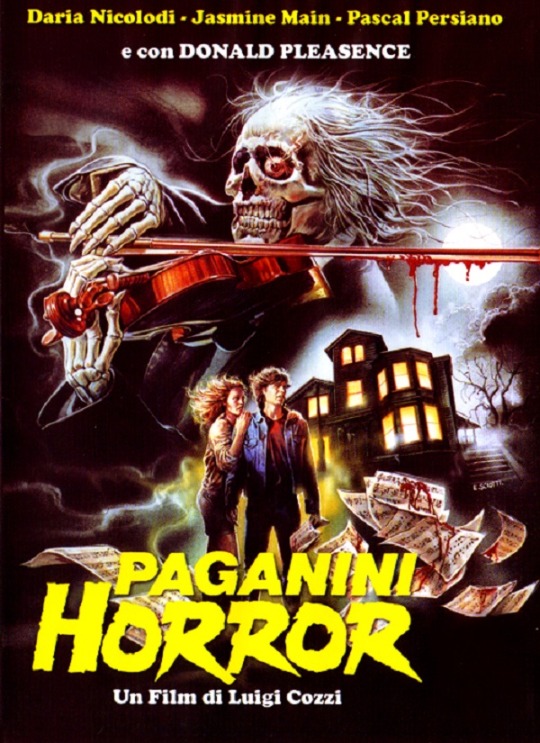
Directed by Luigi Cozzi
Screenplay by Luigi Cozzi and Daria Nicolodi
Music by Vince Tempera
Country: Italy
Running time: 82 minutes
CAST
Daria Nicolodi as Sylvia Hackett
Jasmine Maimone as Kate
Pascal Persiano as Daniel
Maria Cristina Mastrangeli as Lavinia
Michel Klippstein as Elena
Pietro Genuardi as Mark Singer
Luana Ravegnini as Rita
Giada Cozzi as Sylvia (child)
Elena Pompei as Sylvia's mother
Donald Pleasence as Mr. Pickett

Paganini Horror is a terrible 1989 Italian horror movie set in a decrepit Venetian villa where a terrible (mostly) girl pop group film a terrible video for a terrible song based on the terrible idea of using cursed music by Paganini. The aural nonsense these tinsel wits conjure summons the cranky spirit of the deceased composer to dispatch them one by one in imaginative, but seriously underfunded ways. And probably to stop them screaming, because, hoo boy, do these ladies scream. If you are a massive fan of women screaming Paganini Horror is the movie for you, my unusual friend. Much of the running time of Paganini Horror involves neither Paganini nor horror but rather women running around what seems like one corridor and three rooms screaming. Occasionally they all meet up and scream at each other in the same room, or that one bloody corridor. I swear at some points they bounce up and down and flap their hands while screaming like overwrought teenagers at a pop concert.
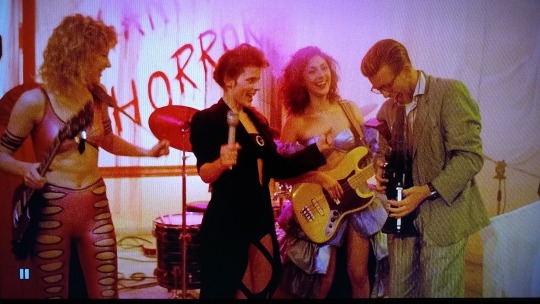
Which is ironic since they are a pop group themselves. They are the kind of fantastically talented (mostly) girl band who do the female cause no favours at all; the kind who play their guitars by keeping their fingers immobile and flat on the strings while provocatively moving their hips about while pulling faces which suggest they are experiencing a sexy form of menstrual cramp. The singer, Kate (Jasmine Maimone), doesn’t have an instrument because she is too busy prancing about, trying to see which she can open wider, her eyes or her mouth. The token bloke, Daniel (Pascal Persiano), is stuck behind the drums because no one wants to see his exposed belly button. I think they sing Bon Jovi’s terrible “You Give Love a Bad Name” but it’s kind of hard to tell. Anyway, they are so bad the movie doesn’t give the band a name (I think; I don’t really care), so we’ll call them The Chilblains. Whatever song The Chilblains are excreting, it isn’t good enough for their producer Lavinia (Maria Cristina Mastrangeli) whose ears apparently work, so Kate and Lavinia shout at each other, and things get so heated that Kate almost pushes a stool over but Lavinia arrests its fall just in time. Rock and roll Babylon! The Chilblains need new material to get them another million seller, and fast!
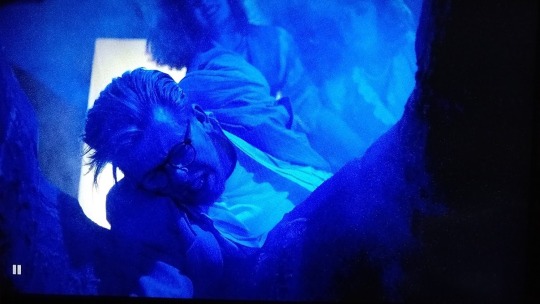
Daniel, the male drummer, sources some groovy material which will get the band back on track by, apropos of nothing, meeting a twitchy Donald Pleasence in a disused warehouse and purchasing a lost Paganini composition. Apparently, actually writing some decent music fails to occur to Daniel. The girls go wild for the fab synthed up sounds of groovy Paganini, and Lavinia books them into a spooky old house Paganini once passed water in, now owned by Daria Nicolodi’s Sylvia Hackett. The idea is to get top horror director Mark Singer (Pietro Genuardi) to make a smashing pop vid and get The Chilblains back shifting millions again. Unfortunately the video is shit. Even more unfortunately the restless spirit of Paganini is so upset by his music being co-opted by talentless chancers that it starts knocking them off in unintentionally amusing ways. You haven’t lived until you’ve seen a woman burned alive in a poorly constructed giant violin case, baby.
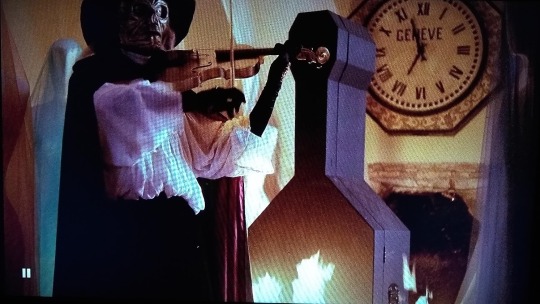
Niccolò Paganini (b.1782) was a real person who probably didn’t live to see a woman burned alive in a poorly constructed giant violin case, but he was a legendarily amazeballs Genoan violinist. While Paganini Horror is hardly a fit cinematic tribute, he is a good choice for a spooky killer. Much like Cher, he is purported to have consorted with the devil, selling his soul in return for prodigious talent. Back then, see, there were no video games or movies for unimaginative reactionaries to blame everything on, so in desperation bits of wood that could make sounds such as the violin were considered the “devil’s instrument”, indicative of poor moral character and likely to cause an excess of excitement. And so extravagant was Paganini’s talent that it was thought only a satanic source could explain it. Or, y’know, he was talented and practiced a lot. Your call. Paganini died in 1840, possibly from mercury poisoning from being treated for syphilis. Maybe from tuberculosis. I don’t know, what am I, a historian? Paganini’s spookiness survived after his death to the extent that he wasn’t laid to rest until 1876, when priests finished debating what they should do with him. Priests apparently had a lot of time on their hands back then. None of that matters since all Paganini Horror is bothered about is Paganini was very musical and a little bit eerie.

Unfortunately looking up Niccolò Paganini on The Internet turns out to be a lot more exciting than watching Paganini Horror. Particularly finding out that all his teeth fell out from his syphilis treatment. But if you are inclined towards terrible Italian horror movies Paganini Horror has the odd slender wisp of a delight. There’s the ever twinkly Donald Pleasence, being all sinister and stuff; and you get quite a bit more of him than I was expecting, which is nice. Unsatisfactory Italian horror movies form a magical late stage in Pleasence’s career, where he basically rocks up acting in a movie which exists only in his head, and ends up being the most interesting thing in the movie outside of his head. Although genre legend (and co-scripter) Daria Nicolodi is intermittently to be seen acting, mostly she just goes with the whole screaming thing. Michel Klippstein as Elena is the best thing in the movie, but not for her acting. Unfortunately it’s because for the bulk of the movie she wears a nasty green lycra jump suit studded with a nonsensical pattern of holes. It’s kind of fascinating in a wholly abysmal way. Paganini Horror isn’t always terribly interesting so you may often find your mind wandering, wondering just how sweaty Michel Klippstein’s get-up got. I bet they had to burn that outfit once the filming stopped. Ew! In the interests of decorum I shall draw a discreet veil of “mostly adequate” over the other performances.
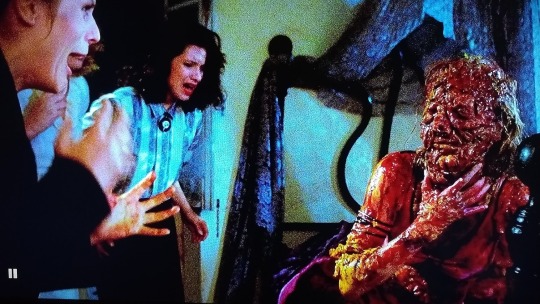
About on a par with the less than impressive acting is Luigi Cozzi’s relentlessly apathetic direction which exacerbates rather than disguises the clearly near lethal budgetary constraints. But would any more money have helped a horror movie helmed by someone so determined to so cluelessley fart away every death scene? Probably not. Make no mistake, Paganini Horror is not only terrible but, worse, it is often quite boring. This is quite a feat since the killer wears a gold mask and looks like a low budget musketeer prancing about and, as comically awesome as it is regrettably underutilised, there is also a gold violin with a spring loaded blade in the base. It’s like Cozzi has accepted a bet to make everything as tedious as humanly possible. In theory Paganini Horror has some clever ideas and creative slaughter, in practice however it is a drearily slow crawl punctuated by tedious screaming and hilariously cheap-shit SFX shenanigans. The best (i.e. worst) example is “The Invisible Barrier” which elicits some fantastic (i.e. rubbish) mime action as our cast pretend to be pushing against something that isn’t there, it also has a car crash into it but…off-screen! and a character is crushed to death by it, which just means the crew press a sheet of glass onto her face to distort it. Eyerolling never had it so good.
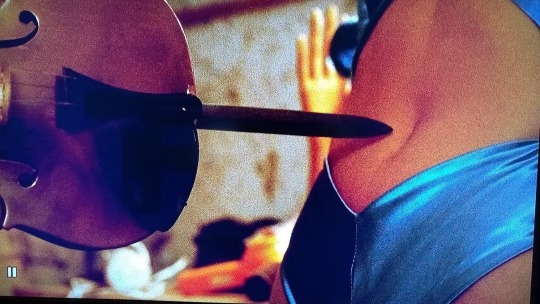
Be warned, sensation seekers of all ages, sure, Paganini Horror all sounds very camp and cheesetastic, but it is neither campy nor cheesy enough. It takes some weird anti-talent to render dull a movie which has a record producer who can identify a fungus by sight as being one used in the 18th century to give Stradivarius violins their unique sound. (I believe Kanye West has the same ability.) Don’t be fooled if any of that sounds fun; Paganini Horror is fun, but not fun enough by far. This Italian mis-fire is fit only for masochistic die-hards like myself rather than your average horror punter up for a good time. Ultimately then, not so much a case of Paganini Horror, but rather Paganini Torpor.

3 notes
·
View notes